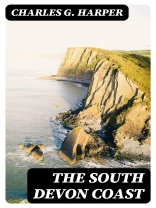In ‘The South Devon Coast, ‘ Charles G. Harper intricately weaves a vivid tapestry of the picturesque landscapes and rich maritime history of South Devon, showcasing the region’s unique charm through a blend of detailed observation and lyrical prose. Harper’s writing is characterized by a painterly style that vividly captures the sights, sounds, and atmospheres of coastal life, while also delving into the cultural and historical significance of the area. The book serves as a poignant reflection of the late 19th-century British literary context, wherein regionalism and a renewed appreciation for nature were prominent themes, allowing readers to both immerse themselves in the natural beauty and understand the deeper cultural narratives of the time. Charles G. Harper, an avid traveler and keen observer, drew from his extensive explorations of the British landscape, fostering a deep connection with the locales he documented. His background as a successful illustrator and writer contributed a unique visual dimension to his work, as he expertly combines prose with illustrations, drawing readers not only into the narrative but also into the very essence of the South Devon coast. Harper’s passion for capturing the fleeting beauty of nature underscores much of his writing, making his works significant in the canon of travel literature. I wholeheartedly recommend ‘The South Devon Coast’ to readers seeking both a historical insight and a sensory exploration of one of England’s most enchanting coastal regions. Harper’s adept storytelling and evocative illustrations will resonate with anyone yearning for connection to the natural world, while his rich observations offer valuable context for understanding the interplay between nature and culture in the English seaside experience.
About the author
Charles George Harper (1863–1943), not to be mistaken with the similarly named contemporaneous cartoonist Charles Henry Harper, was an English author and illustrator. Renowned for his travel writing and topographical studies, Harper’s works provide an insightful glimpse into the British landscape and cultural identity of the late 19th and early 20th centuries. One of Harper’s notable contributions to literature is ‘The South Devon Coast’, a richly detailed account of the southern coastline of Devon, a county in England. In this exploration, Harper blended historical context with his experiences and observations, offering a comprehensive look at both the scenic splendor and the social fabric of the region. Harper’s literary style was characterized by a keen eye for detail and an engaging narrative voice, which brought the settings to life and made his books both informative and entertaining for a wide range of readers. Through his extensive travels and prolific output, Harper contributed significantly to the genre of British travel literature, leaving a valuable legacy for both historical and cultural studies.












